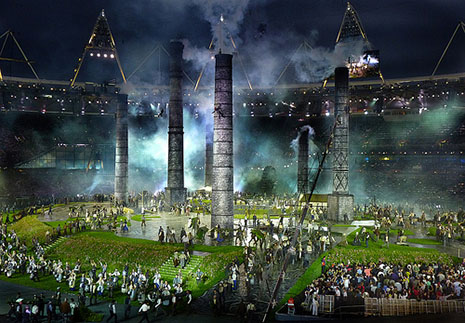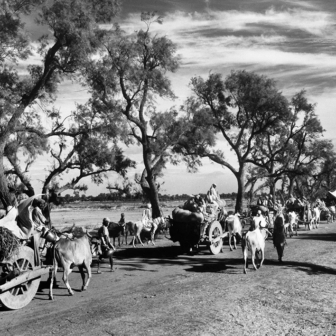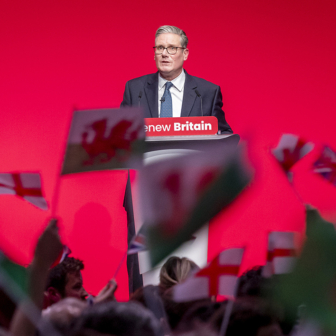THIS is a slow country to move. After seven years of preparation, months of publicity, weeks of fractiousness and days of panic, Britain had still not quite adjusted itself to the idea that it was to play host to the 2012 Olympic games. In the end, it took an instant of art to unlock the heart. True, at two hours the opening ceremony on the evening of 27 July in the gleaming new Olympic stadium in east London was, for an instant, on the long side. But the unfolding revelation that a genuine artistic vision of this complicated country was at work – coupled with the evanescence intrinsic to the occasion – sharpened the emotional effect. And, if much of the world was bemused, Britain was duly moved.
The creative director Danny Boyle’s affectionate, people-centred collage of national particularity and inventiveness offered an exuberantly different pantheon from the familiar top-down one – pioneering engineers, toilers of the industrial revolution, suffragettes, musicians, children’s writers, the public health service, youngsters out on the town – while respecting (but thus also repositioning) more established figures already secure within it. A formative inspiration was the work of the modernist–romantic film-maker Humphrey Jennings (1907–50), especially his anthology of lesser-known texts (or “images,” as Jennings preferred) charting Britain’s transformation, Pandaemonium: The Coming of the Machine as Seen by Contemporary Observers. The influence of Jennings’s lyrical wartime documentaries – including the soundscape Listen to Britain (1942) and Fires Were Started (1943), whose acute social detail is observed with a surrealist eye – was also evident.
“Isles of Wonder” was spellbinding, humane, witty – and contained elusive multitudes. (In the course of praising the dedication of the 15,000 actor-volunteers, the show’s writer Frank Cottrell Boyce noted the pleasing fact that “wherever you looked, people were doing something different.”) The highlights included Caliban’s lament for his lost island from The Tempest, the most ambiguously fertile of Shakespeare’s plays; Isambard Kingdom Brunel, whose great buildings and bridges drew a new social landscape; William Blake’s Jerusalem, whose musical setting by Hubert Parry gives it an emotional charge that makes it England’s unofficial anthem; Mary Poppins vanquishing Voldemort, villain of the Harry Potter stories; J.K. Rowling herself reading from Peter Pan; John Milton’s Paradise Lost, the wellspring of Pandaemonium; a sonic kaleidoscope of modern pop, from The Jam to Dizzee Rascal; and many others, often represented in glancing but pinpoint detail (such as the blink-if-you-missed-it references to eternal romances such as A Matter of Life and Death and Gregory’s Girl).
The animating spirit of a beautiful fantasy was encapsulated in the paean to Tim Berners-Lee, founder of the world wide web: “this is for everyone.” Its propulsive narrative – that the subversive, imaginative spirit of a multifarious land is the source of its achievements, and that it is now confident enough to pass on the torch to those kids – was both intelligent enough to accommodate the sensibilities of the “official version” of national history (including in its post-imperial, “inclusive” variants) and bold enough to claim fresh ground.
Boyle engagingly said that the intention of a ceremony three years in the making was to be “proud and modest.” In the event it wholeheartedly embraced the contradictions implicit in these words, and dramatised a generous, optimistic, democratic (and England-centred) patriotism. As a work of art it “bears within itself its own verification” (to cite a phrase of Solzhenitsyn), and might have been thought hard to unpick without violating its integrity. But it immediately became clear that Britain’s always-on army of partisan activists and pundits knew better.
The politicisation got in early: a Conservative member of parliament questioned the ceremony’s “leftie” bias even as it was taking place, followed within a day by columnists of right (a “social worker’s history of Britain,” wrote the polemicist Peter Hitchens, never one to let a prejudice go to waste, while Stephen Glover called it “strictly Marxist”) and left (“here was our march past,” purred the Labour MP and historian Tristram Hunt, who also – like anti-independence campaigners in Scotland – conscripted the show into the “pro-union” camp). The mythographer Marina Warner read it as a “reproach to the current government,” though the responses of the prime minister David Cameron and London’s mayor Boris Johnson were warm and unembarrassed.
It did not take long, then, for those who know everything already to begin to do the only thing they know, grind diamonds into rust (including via numerous laments about what was “omitted” – from slavery to the Magna Carta). Britain’s left–right orthodoxies are well-protected from the dangers of artistic subversion by their exclusivist memory-packs and endlessly self-referential formulae. This political reductionism ensures that the invigorating effect of “Isles of Wonder” will soon fade – and, worse, be parlayed into cheap point-scoring at party conferences.
It’s understandable that the show presents an irresistible hook for searchers of social hope in tough times, and there is indeed abundant material in it to keep Britain’s perennial culture wars boiling for years to come. The paradox, though, of an instrumentalised and over-political reading is that it asphyxiates whatever potential for change the event may have, which lies precisely in its capaciousness (as much, it might be said, as The Tempest itself, which five centuries after its composition is still open to new readings, including post-colonial).
But if the curse of literalism is unavoidable and an effort at appropriation inevitable, the serious left, instead of claiming the event as “ours,” might be better advised to ask, apropos Antonio Gramsci’s theory: is this, after all, an imaginative guide to how “hegemony” can be made to work?
OF THE millions of words already devoted to “Isles of Wonder,” the most resonant belong to the Chinese artist, Ai Weiwei, now better known as an outspoken dissident and former detainee than as co-designer of the landmark “bird’s nest” stadium for Beijing’s 2008 Olympics. He described the ceremony as “free, relaxed and touching – a festival of modern citizens.”
Allowing for the fact that everything that Ai Weiwei writes is also “about” China, his comment is both a mirror and a challenge to a host country that in other times and areas of public life would struggle to earn such an accolade. The run-up to the Olympics, a recent period that already seems far distant, is an example, but also works as a prudent illustration of how transient the dominant mood in Britain often turns out to be.
The heatwave had arrived in the third week of July, just in time. An early summer of heavy rainfall across much of Britain had brought minor discomfort to millions and real hardship, in the form of flooded homes and fields, to thousands of householders and farmers. The increasing frequency of such “exceptional weather events” in a traditionally temperate country, and its possible connection to global climate change, was widely discussed, while on an everyday level the vagaries of the weather – that “ever-interesting, even thrilling topic,” in George Mikes’s wry comment on an English obsession – saturated daily conversations and media reports.
The overall tone of public exchanges, taking account of localised disasters and the occasional tragedy precipitated by the monsoon, was lighthearted: a mix of fatalism, adjustment and jocularity that comes close to the default national attitude.
As the temperature soared and the fields dried, the same combination – with an additional shot of cynicism, a potent late addition to the template – was apparent with the approach of the Olympics. The imminence of the global sporting–broadcasting–commercial extravaganza seemed to enter broad public consciousness only in the countdown weeks, and a welcoming tone was hard to find. A strike announced by the union representing passport control workers, even as long delays at leading airports had become routine, made the headlines – “chaos,” “fiasco,” “shambles” – for once look almost accurate. Sarah Lyall, the longstanding New York Times correspondent, was struck by how Londoners were “practicing some of their own favorite sports: complaining, expecting the worst and cursing the authorities... [Many feel] that they are getting the worst parts of the Olympics – the cost, the hassle, the officials telling them not to do things or go places – without any of the benefits.”
The sour atmosphere deepened with an acknowledgment by the private security company charged with (and handsomely paid by government for) recruiting and training personnel to monitor the Olympic sites and visitors that it was proving unable to meet its agreed targets. The deployment of 3500 troops – some returning from a tour of duty in Afghanistan – was hurriedly announced to fill the gap.
Indeed, the issue of security became more dominant as the games drew ever nearer. An underlying fear of terrorist spectacle has been entwined with the timeline of this Olympics from the start, when the announcement (in Singapore) of London’s award on 6 July 2005 – greeted by a joyous crowd in Trafalgar Square – was followed a day later by the coordinated bombing of its transport network by “homegrown” radicals that killed fifty-two passengers. The permanence of the threat (from “dissident” Irish republicans as well as extreme Islamists) underpins a complex and intensive intelligence operation involving 8000 personnel and costing £1 billion. Most of this remains below the radar, though Charles Farr, director-general of the office of security and counter-terrorism, admitted to the BBC’s well-sourced security correspondent Gordon Corera that the authorities’ measure of danger is close to the peak.
The more intrusive precautions, as Geoffrey Barker relates in his trenchant Inside Story article, include the placing of surface-to-air missiles on the rooftop of an apartment block in east London to ensure control of airspace around the Olympics site, which some residents protested against and sought to thwart via a legal injunction. The pre-Olympics security lockdown – which to the everyday resident can appear only a little more irksome than the norm, especially in a year of high-profile events – fuels a critical narrative that sees everywhere an experiment in political intimidation whose real target is less the terrorist enemy (assumedly phantom, or at least wildly exaggerated) than the domestic population.
The argument in turn forms a sub-current of a wider repertoire of charges against the London games tout court, whose insistent themes – the expense of their staging, commercialism (the leading sponsors and their advertising hegemony are much anathematised), elitism (typified by the privileged “Zil” traffic lanes), exclusion (the rigorous fencing-off of the inner zone is imbued with sinister connotations), long-term disruption (of local residents) and expropriation (of public land) – orchestrate the accumulating frustrations of the post-2008 years of financial crisis, austerity and inequality. A neat, self-confirming conclusion follows – that the Olympics, far from being a springboard to regeneration, are a physical embodiment of Britain’s economic, social, political and even moral malaise.
The immediate pre-games period was a high point for this narrative – in part because the G4S company’s recruiting failures fed into more general unhappiness with the Conservative–Liberal Democrat government, in part because a temporary alliance was then possible between the more political critics and Britain’s well-populated army of all-purpose cynics. (The two groups overlap, and fuel each other’s conceits, but they are not identical.)
The “counter-Olympics” trend provides a healthy counterweight to official boosterism and serves the demand for an integrated portrait of confusing times. It is also powerful and malleable enough to survive the games and find new targets when the caravan moves on. But where the games were concerned, after coasting on an imaginary wave of public disaffection, its tide receded at a moment of apparent triumph.
This was the parliamentary inquisition on 17 July of G4S’s hapless chief executive Nick Buckles, which provoked a fierce ridicule (of both the company and the government) that had something of the cathartic about it. It was as if, at last, the people were exacting a price from the authorities for a host of depredations – foisting the event on a reluctant country, turning a large part of east London into a construction site, reordering the capital’s traffic system, messing up a key part of the preparation – but also proffering their belated downpayment for admission (“now we will give this our attention, but as... modern citizens!”).
Even at the time it seemed a turning point – if only because the level of pre-Olympics complaint had gone so far that (in a familiar rebalancing fashion) an auto-corrective was certain. The shift was sudden and palpable. The extended relay of Olympic torchbearers, where the sight of local heroes and celebrities in photogenic locations had drawn immense crowds across the country, finally reached London to be carried through all the city’s thirty-three boroughs. The media as well as the popular reaction was striking, with a rush of columnists renouncing their self-styled “scepticism” and embracing the excitement to come. The athletes and visitors began to arrive, the enthusiastic volunteers began to receive their due, the broadcasters got into gear, even the passport-workers’ strike was called off.
The invisible contract between people and authorities having been signed, both were now ready to settle down to what the British do best: namely (to adapt a phrase once used by the poet and critic Tom Paulin) erect a totem pole and then dance around it. And, in the shape of a model of Glastonbury Tor and “Queen Elizabeth” descending by parachute from a helicopter alongside James Bond, the totem pole duly arrived.
A WEEK into the competition, “Olympomania” has taken hold. The complaints of the run-up, the government’s April–June “omnishambles,” could belong to the last century. Today’s forgetting, though, is tomorrow’s remembering, and they will be back in another guise, just as current euphoria around the games (albeit shadowed by concerns over empty seats, ticket sales, and hotel vacancies) will soon evaporate.
Such constant jolts from one theme, story, controversy, scandal and mood to the next are a feature of the ever-shortening cycles of Britain’s political life. This does nothing to still predictions that the games will be “era-defining” and transform the country’s sense of itself.
The very rapidity and atmosphere of urgency of the media–political waterfall make it addictive. Its dominant features – hyperbole, tribalism, amnesia – are encouraged by commercial pressures and now superglued by social media’s ruthless conformism. It is then all too tempting to embrace the conceit that large-scale social or economic change – real, lasting change – can be won on the same ground. There are, though, other rhythms at work, and it is by understanding and tapping into them that change-making, for good or ill, becomes possible.
The depth of the reaction to “Isles of Wonder” surely reflects widespread longing for political and national uplift, even for a kind of redemption (whether that nation be Britain or England). But the ceremony, or the Olympics in general, won’t be so easily conscripted. After all, there are no short cuts. This is a slow country to move. •




